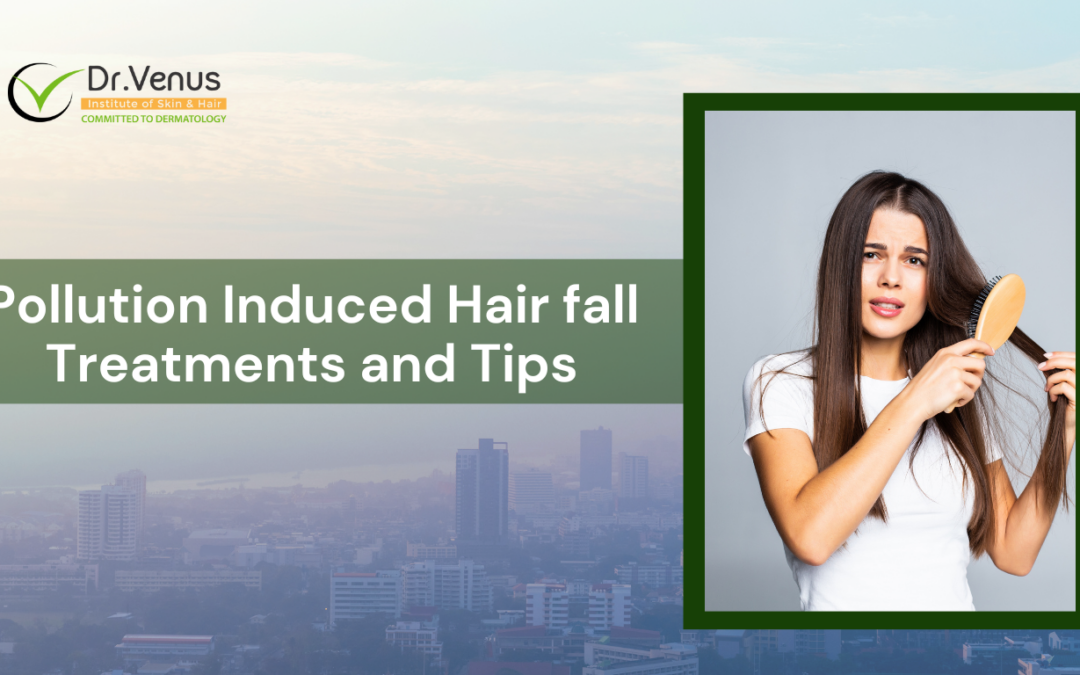Pollution and its adverse effects on human health have garnered significant attention in recent years. However, what many people may not realize is that pollution can also wreak havoc on the health and appearance of our hair. As pollutants in the environment continue to increase, it’s crucial to understand the connection between pollution and hair problems, particularly hair fall. Let us explore the various ways pollution affects your hair, discuss effective hair fall treatments, and provide practical solutions to safeguard your hair from the harmful effects of pollution.
Part 1: Pollution and Its Effects on Hair
Before discussing remedies and treatments, let’s first understand how pollution affects our hair.
1. Air Pollution
Air pollution, including particulate matter (PM), volatile organic compounds (VOCs), and nitrogen dioxide (NO2), can penetrate the hair shaft, leading to hair damage. These pollutants can strip your hair of its natural oils and moisture, making it dry and brittle. Additionally, air pollution can cause oxidative stress, resulting in premature graying and hairloss.
2. UV Radiation
Ultraviolet (UV) radiation from the sun, combined with pollution, can lead to the breakdown of proteins in the hair, such as keratin. This results in weakened hair strands, making them more prone to breakage and hair fall.
3. Hard Water
Many urban areas suffer from hard water, which contains high levels of minerals like calcium and magnesium. Washing your hair with hard water can lead to mineral buildup on the hair shaft, making it difficult for moisture to penetrate the hair. Over time, this can cause hair to become dry, brittle, and susceptible to hair fall.
Part 2: Understanding Hair Fall
Hair fall is a common issue that many individuals face, and it can be aggravated by pollution. Several factors contribute to hair fall, including genetics, hormones, diet, and environmental factors. Pollution plays a significant role in this equation.
1. Oxidative Stress
As mentioned earlier, pollution can cause oxidative stress on the hair and scalp. Oxidative stress damages hair follicles, leading to hair thinning and eventual hairloss.
2. Inflammation
Exposure to pollutants can cause inflammation of the scalp, weakening the hair follicles. Inflammation disrupts the natural hair growth cycle, resulting in increased hair fall.
3. Reduced Blood Circulation
Pollution can affect blood circulation in the scalp. Inadequate blood flow can limit the delivery of essential nutrients to the hair follicles, making them weaker and more susceptible to falling out.
Part 3: Hair Fall Treatment
Dealing with hair fall can be a daunting task, but there are effective hair fall treatment options available. Let’s get to know a few of the most common treatments:
1. Maintain a Healthy Diet
A balanced diet that includes essential nutrients like protein, biotin, and iron is vital for healthy hair. Protein is the building block of hair, while biotin and iron support hair growth and strength. Incorporate foods like eggs, lean meats, fish, nuts, and leafy greens into your diet.
2. Hair Care Routine
Implement a hair care routine that focuses on cleansing and moisturizing your hair and scalp. Use sulfate-free shampoos and conditioners to avoid further damage is one of the proactive hair fall treatment. To avoid damage, use moderate care when shampooing and drying your hair.
3. Scalp Massage
Regular scalp massages can improve blood circulation and promote hair growth. You can use natural oils like coconut or castor oil for better hair fall treatment.
4. Medications
For advanced hair fall treatment, consult the best dermatologists from Dr.Venus. They may recommend medications, which can help stimulate hair growth and prevent further hair loss.
Part 4: Solutions to Protect Your Hair from Pollution
Preventive measures are the first step to protect hair from pollution-related issues. Here are some useful suggestions for protecting your hair:
1. Cover Your Hair
Wearing a hat, scarf, or cap can shield your hair from the harmful effects of pollution, UV radiation, and environmental contaminants. This is especially important on days with high pollution levels or prolonged sun exposure.
2. Use Anti-Pollution Hair Products
Consider using hair care products specifically designed to combat the effects of pollution. Using hair fall treatment products such as anti-pollution shampoos and conditioners can clean your hair and keep it safe from pollution.
3. Regular Detox for Hair fall Treatment
Just like your skin, your hair deserves a detox as well. Consider using a clarifying shampoo once a month to remove buildup and pollutants from your hair.
4. Air Quality Awareness
Be aware of the air quality in your area. When pollution is high, use hair fall treatment to protect your hair from harmful stuff.
5. Hydrate and Nourish
Moisturize your hair regularly, using deep conditioning hair fall treatments and masks. This will help combat the dryness caused by pollution and UV radiation.
6. Filtered Shower Water
Consider installing a shower filter to reduce the mineral content in your water if you have hard water. This can prevent mineral buildup on your hair.
7. Stay Hydrated
Drinking an adequate amount of water is not only beneficial for your overall health but also for the health of your hair. Proper hydration keeps your hair well-nourished and resilient against pollution.
Conclusion
Pollution’s adverse effects on hair, are a growing concern in our increasingly polluted world. To maintain healthy and beautiful hair, it’s crucial to understand how pollution impacts it and take proactive steps to protect and nurture it. With the right hair fall treatment, hair care routines, you can minimize the effects of pollution and enjoy healthy, lustrous locks, regardless of the environmental challenges. At Dr. Venus, the best skin and hair clinic in Hyderabad, we highly recommend consulting with a dermatologist for personalized hair fall treatments with best results.
